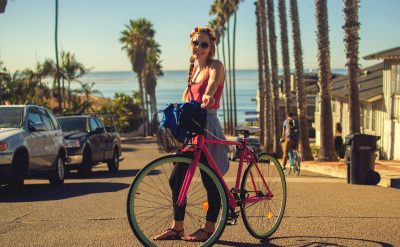
First purchase with a 10% discount, use promo code: Newtyres10
10% discount, use promo code: Newtyres10
Blog
Commuter Bikes for 2025: How to Choose the Best Bike for Daily Travel

14
May
With rising fuel prices, growing environmental concerns, and the desire for a healthier lifestyle, more people than ever are turning to bikes for their daily transportation needs. In 2025, commuter bikes are at the forefront of this shift, offering riders a practical, economical, and sustainable way to get to work, school, or run errands.
But with so many options on the market—from sleek urban hybrids to cargo-hauling workhorses—how do you choose the best commuter bike for your lifestyle? In this comprehensive guide, we’ll walk you through the key features to look for, the different types of commuter bikes available in 2025, and how to match a bike to your specific travel needs.
🚴 Ready to switch to two wheels? Discover our curated collection of high-quality Commuter Bikes built for efficiency, comfort, and urban mobility.
What Is a Commuter Bike?
A commuter bike is designed specifically for daily travel in urban and suburban environments. It’s built with comfort, durability, and practicality in mind, often equipped with features that make commuting safer and more enjoyable—like fenders, racks, integrated lights, and upright seating positions.
Unlike racing or mountain bikes, commuter bikes emphasize:
- Efficiency on pavement
- Reliable components
- Comfortable geometry
- Compatibility with accessories like baskets, panniers, and fenders
Top Benefits of Using a Commuter Bike in 2025
- Saves Money
Skip gas stations, parking fees, and public transport costs. A one-time investment in a commuter bike can pay for itself in just a few months of regular use.
- Eco-Friendly
Zero emissions and minimal energy consumption make cycling one of the most sustainable forms of transportation available today.
- Health and Wellness
Cycling is an excellent cardiovascular workout. Even a short daily ride improves heart health, boosts mental clarity, and reduces stress.
- Time Efficiency
In congested cities, bikes can often be faster than cars—especially during rush hour. You also avoid the stress of traffic jams and parking.
- Freedom and Flexibility
No need to worry about transit schedules. With a commuter bike, your departure time is entirely up to you.
Types of Commuter Bikes
There is no one-size-fits-all commuter bike. The best option depends on your distance, terrain, weather, and personal preferences. Here are the most common types:
- Hybrid Bikes
A mix between road and mountain bikes, hybrids are the most popular commuter choice. They offer an upright position, wide tires, and versatile gearing.
- Best for: Mixed terrain, beginners, general urban commuting
- Urban/City Bikes
Streamlined for short rides and city traffic, urban bikes often come with fenders, racks, and internal gear hubs.
- Best for: Flat city streets, short distances, low maintenance
- Electric Commuter Bikes (E-Bikes)
Equipped with a battery and motor, e-bikes make longer commutes and uphill rides a breeze.
- Best for: Long-distance commuting, hilly terrain, less sweaty rides
- Folding Bikes
Compact and portable, these bikes fold down to fit in offices or public transit.
- Best for: Small apartments, mixed-mode commuters, urban minimalists
- Cargo Bikes
Designed to carry heavy loads—like groceries or children—cargo bikes are ideal for people replacing a car with a bike.
- Best for: Errands, child transport, deliveries
🔍 Not sure which to choose? Explore our full range of Commuter Bikes to find the perfect match for your commute.
Key Features to Look For in a Commuter Bike
✅ Comfortable Geometry
Look for an upright or semi-upright frame that reduces strain on your back, wrists, and shoulders. A comfortable saddle and ergonomic grips are essential.
✅ Gearing
If your route is flat, a single-speed or internal hub gear is low-maintenance and efficient. For hilly commutes, opt for a bike with multiple external gears.
✅ Fenders
Keep you dry and clean when riding in the rain or through puddles—an essential commuter feature.
✅ Lights and Reflectors
Many modern commuter bikes in 2025 come with integrated LED lights powered by a hub dynamo or battery. Visibility = safety.
✅ Tires
Wider tires (32–42mm) offer better comfort and grip on rough urban surfaces. Puncture-resistant options are a smart choice for daily riders.
✅ Luggage Options
Racks and panniers allow you to carry your laptop, groceries, or gym gear without a sweaty backpack.
✅ Kickstand and Bell
It may seem minor, but these small additions make city commuting easier and safer.
FAQs: Choosing and Using Commuter Bikes
Q1: What’s the difference between a road bike and a commuter bike?
Road bikes are designed for speed and long-distance riding, usually in a racing posture. Commuter bikes prioritize comfort, durability, and practicality for everyday short-to-medium distance travel.
Q2: Should I get a regular or electric commuter bike?
If your commute is long, hilly, or you prefer arriving without breaking a sweat, an e-bike is a great choice. Otherwise, a traditional bike offers excellent value and low maintenance.
Q3: How do I protect my commuter bike from theft?
Invest in a high-quality U-lock and consider GPS tracking. Lock your frame and one wheel to a secure object—preferably in a well-lit, high-traffic area.
Q4: Can I ride a commuter bike in the rain?
Yes! With fenders, proper lights, and weather-appropriate clothing, biking in the rain is perfectly manageable. Disc brakes are especially useful in wet weather.
Q5: How much should I spend on a commuter bike?
Quality commuter bikes start around $500. A solid mid-range bike with reliable components can range from $800–$1,500. E-bikes generally cost more but provide added convenience.
2025 Trends in Commuter Cycling
🔋 Rise of E-Bikes
Electric commuter bikes are surging in popularity, thanks to better battery life, lightweight frames, and expanded urban infrastructure supporting micromobility.
🌿 Sustainability
Bike manufacturers are using recycled materials, sustainable paint, and eco-friendly packaging to reduce their carbon footprint.
🛣️ Smart Infrastructure
More cities are expanding protected bike lanes, bike-sharing programs, and secure parking stations, making cycling more appealing and safer than ever.
📱 App-Connected Bikes
Many commuter bikes now come with Bluetooth or app integration for tracking rides, adjusting lights, and securing the bike electronically.
Tips for a Better Commuting Experience
- Plan Your Route: Use apps like Google Maps or Komoot with cycling mode to find bike-friendly roads.
- Dress for the Ride: Wear weather-appropriate, reflective clothing and layer if needed.
- Prep the Night Before: Pack your gear, charge your lights or e-bike battery, and check your tires.
- Stay Visible: Lights, bright clothing, and reflectors help drivers see you in all conditions.
- Maintain Your Bike: Clean your chain regularly, check tire pressure weekly, and get a tune-up every few months.
Final Thoughts
Riding to work or school doesn’t have to be a hassle. With the right commuter bike, daily travel becomes a joy—combining freedom, fitness, and functionality. As 2025 brings more innovation and city infrastructure designed for bikes, there’s never been a better time to join the cycling revolution.
Whether you’re tackling a 5-mile city route or weaving through traffic with your laptop in tow, there’s a commuter bike out there that’s perfect for your needs. Take time to assess your route, gear preferences, and budget—and don’t forget to invest in safety gear.
🚲 Ready to roll? Browse our full lineup of dependable, stylish, and well-equipped Commuter Bikes and start transforming your daily commute today.





